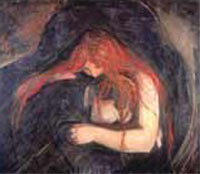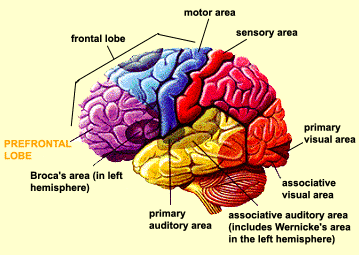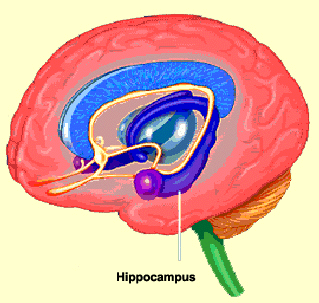An estimated 1 out of 5 women and 1
out of 10 men will experience depression at some time in their
lives, which makes this a very common ailment. Depression can
prevent people from coping with their normal activities, their
work, and their relationships, thus seriously compromising their
sense of well-being and their ability to live their lives.
Psychiatrists generally consider someone to be suffering from depression when
they present at least 5 of the following symptoms almost every
day for at least 2 weeks:
Depressed mood for a large part of the day
|
Lack of interest or pleasure in
almost all daily activities
|
Decrease or increase in weight or appetite
|
Insomnia or excessive sleeping
|
Agitated movements (such as wringing of hands) or slow
movements
|
Fatigue or loss of energy
|
Feelings of worthlessness or excessive guilt
|
Indecisiveness or difficulty in thinking or concentrating
|
Recurrent thoughts of death (in 60% of cases) or suicide
(in 15%)
|
Once a doctor diagnoses depression, it is important to begin a
course of treatment as
quickly as possible, to prevent the depressive state from getting
worse. Left untreated, depression tends to become chronic or recurrent,
and major depression leads to suicide in about 15% of the people
who suffer from it.
| SYMPTOMS, TREATMENTS, AND CAUSES OF MANIC DEPRESSION | |
|
| Manic depression
has been known since ancient times, but it was a German
psychiatrist, Emil Kraepelin, who first described its symptoms
more systematically, in the late 1800s. Today, specialists
prefer the expression “bipolar disorder”, which
avoids the negative connotations associated with the word “manic”. |
|
 |
Unlike ordinary people whose moods are
influenced by specific events in their lives, people with bipolar
disorder seem to follow their own cycle of mood fluctuations.
Like passengers strapped into a roller coaster, they have no
choice about the ups and downs; they must simply go along for
the ride.
And “ups and downs” is an appropriate description,
because unlike depression (also known as “unipolar disorder”),
bipolar disorder includes not only
depressive
states characterized by the same systems as depression,
but also “manic” episodes that alternate with them.
During these manic phases, individuals are excessively exuberant.
Their thoughts race feverishly, leading to extravagant behavior.
They see patterns everywhere—everything seems connected
to everything else, and the smallest event can take on an exaggerated
meaning. These people can also be very creative; the connections
that they draw between things constantly inspire them with
new ideas and new theories.
More systematically, specialists often
distinguish four major categories of
symptoms of
manic episodes:
1) External appearance. The individual’s
external appearance is extravagant or sloppy, provocative,
or even indecent. A person in a manic phase may call
out to strangers in the street with an abrupt familiarity,
sometimes mixed with sarcasm.
2) Mood exaltation. During manic phases,
individuals feel exuberant and have extreme confidence
in their own powers and charm. They have sexual adventures
with no thought for the possible consequences and often
with a total lack of inhibition or tact. They do not
tolerate any criticism of themselves and are easily
irritated and angered.
3) Accelerated thought processes.
Manic individuals’
thoughts come so fast that their words can’t keep up
with them. They evoke one image, then move on to the next before
their listeners have had time to absorb the first one. They
keep jumping from one unrelated topic to another and keep talking
even if people have stopped listening. Their ability to focus
their attention is greatly diminished, but their imagination
is greatly amplified.
4) Motor hyperactivity. In manic phases,
people don’t know the limits of their own strength.
They don’t take the time to eat or sleep. They
take on several projects at once without stopping to
determine whether they are even feasible. These individuals
make major upheavals in their lives (change jobs, go
on long trips, make foolish expenditures, etc.) and
may become distrustful or even paranoid, accusing the
people around them of wanting want to keep them from
carrying out their grandiose plans.
From all these symptoms, one can easily see why it is vital
to ensure that people with bipolar disorder receive
appropriate
treatment quickly. Even though
the
causes of these diseases are still incompletely understood,
there are ways to reduce their effects considerably.
So I thought this information could help us understand a bit more of how Hero was before she topped herself. Also Claudio could use some of these symptoms in the play, later on that is, when he starts to completely lose the plot.




